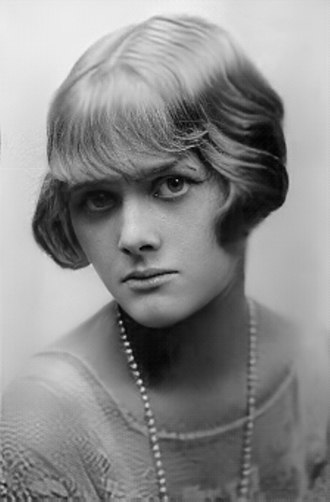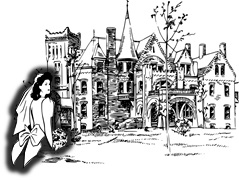Du Maurier, Daphne
Daphne du Maurier was born in London in 1907 into a family steeped in the arts. Her father was an actor manager and her mother was an actress. Her grandfather was an author and cartoonist; one of her uncles was a playwright, another an author and journalist. Du Maurier had two sisters, one an actress and the other a painter. Yet another link to the arts lies with her cousins, who were the inspiration for the characters in
Peter Pan. Du Maurier’s family were clearly relatively wealthy. She spent a lot of her childhood at Cannon Hall in Hampstead.
See the house here. As an adult, du Maurier made Menabilly, Cornwall her home, using it as a setting for much of her writing, including the inspiration for Manderley from
Rebecca. Place was incredibly important to du Maurier. She said, ‘No person will ever get into my blood as a place can [...] People and things pass away, but not places’.
Du Maurier’s first novel was published in 1931. At first, she was described as a romantic novelist; however, she was unhappy with this label, regarding her work to be more accurately compared to the sinister style of writers such as Wilkie Collins, who wrote
The Woman in White. In fact, her attitude to romance appears to have been rather cynical; she said, ‘Women want love to be a novel, men a short story’. Her later work certainly proved to fit more into the mystery genre, with the ghostly undertones throughout
Rebecca (1938) and the peril in
Jamaica Inn (1936), as well as the horror she created in her short story ‘The Birds’ (1952), all three of which have had film adaptations directed by Alfred Hitchcock.
Despite her overwhelming success as a writer, du Maurier’s career was not without controversy. Both
Rebecca and ‘The Birds’ had plagiarism claims against them. The circumstances surrounding these claims involved the fact that du Maurier and the Brazilian author who made the claims about
Rebecca shared a publisher; du Maurier was also said to have been a reader for the publisher of the author who brought about the claims against ‘The Birds’. Du Maurier argued that the claim against
Rebecca regarded plot devices which were used by many writers. By the time ‘The Birds’ was brought into question, Universal Studios was on board for the film and any claim would have been incredibly costly for the claimant. Another writer sued du Maurier and her publishers for alleged plagiarism in
Rebecca but the claim was dismissed.
Despite growing up surrounded by actors and forging a successful career as a prominent writer, du Maurier was a private person, enjoying solitude and shunning the limelight. She said, ‘I wondered why it was that places are so much lovelier when one is alone’. Her career was clearly at odds with the quiet life she valued, and we can see the discontent this brought her when she says, ‘Living as we do in an age of noise and bluster, success is now measured accordingly. We must all be seen, and heard, and on the air’. Her attitude to publicity is clear in this quotation: ‘Writers should be read, but neither seen nor heard’. It seems that du Maurier was happiest when left alone to write, and it is clear that she put all of herself into her writing when she said, ‘When one is writing a novel in the first person, one must be that person’ and ‘Writing every book is like a purge; at the end of it one is empty [...] like a dry shell on the beach, waiting for the tide to come in again’. In total, du Maurier wrote 29 novels, as well as biographies, plays and short stories.
In 1943, du Maurier moved to Menabilly, in Cornwall. She had come across the property a number of years earlier and used her memory of the house as the inspiration for Manderley in
Rebeccaa. When she rediscovered Menabilly, it had fallen into a state of disrepair having been neglected for a number of years. She restored the house while living there; however, it returned to the original owners in 1969, who still own it today.
Read more about the house here.
After leaving Menabilly, Du Maurier moved to Par in Cornwall, another home she used as a setting for her writing, this time
The House on the Strand (1969). She remained in her beloved Cornwall for the rest of her life, dying at her home in Par in 1989. True to her private nature, she chose not to have a memorial service and requested that her ashes be scattered from the cliffs near her homes in Cornwall.
Visit the Daphne du Maurier website here.




